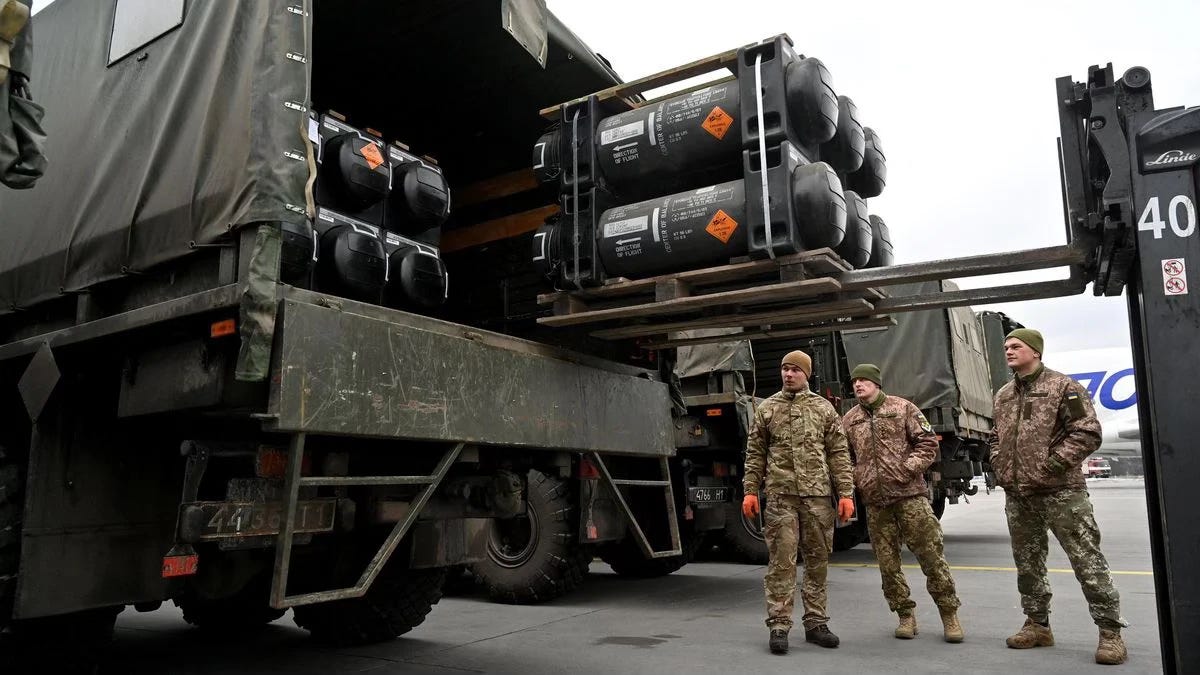Ukraine de-Funded
Germany slashes Ukraine funding in savings push, Sold Out: Support for Ukraine, Israel and Houthis trade blows as Red Sea shipping crisis enters new phase
Germany slashes Ukraine funding in savings push
German leaders plan to halve aid to Ukraine just as Donald Trump’s victory in the U.S. presidential election looks increasingly likely.
By Mathew Karnitschnig, Bette Nostlinger, Jurgen Clocker, Joshua Posaner, Henry Donovan
BERLIN — Germany, which overcame its initial reluctance to support Ukraine to become the country’s biggest European supplier of military aid, looks poised to change course as the government plans to slash future assistance by half in order to fulfill other spending priorities, according to a finance ministry document.
The German finance minister on Wednesday detailed his country's preliminary 2025 budget, in which military aid to Ukraine is slated to be cut by half to just €4 billion, according to a draft seen by POLITICO.
Speaking after the cabinet approved the draft budget, Finance Minister Christian Lindner said Ukraine would have to rely more on funds from "European sources" as well as hoped-for income from frozen Russian assets.
"The aim is to make $50 billion available this year, Ukraine can then decide for itself how to use them," he added, referring to a deal on Russian assets struck by world leaders last month.
The decision to cut aid to Ukraine, which was first reported by Reuters, resolves a mystery surrounding the German coalition's unexpected agreement over the budget following an all-night bargaining session two weeks ago.
At the time, Chancellor Olaf Scholz, Lindner and Vice Chancellor Robert Habeck offered only vague explanations for how they had managed to bridge a substantial financing gap that threatened to bring down their alliance. The three partners were at odds over how to fund increases in social programs and climate initiatives without violating Germany's debt rules.
That they waited until the last day of regular business before much of political Berlin leaves on summer holiday suggests they were well aware of the political sensitivity of the move, which will likely be seen in Kyiv as further evidence of Germany overpromising and underdelivering on assistance. Scholz's government has dragged its feet on helping Ukraine since the beginning of Russia's onslaught, drawing ridicule for an early offer to send helmets weeks before the full-scale invasion.
That said, Berlin has done more overall for Ukraine than any other European country. In addition to thousands of rounds of artillery shells and armored vehicles, the government has provided substantial help on air defense and other systems. Defense Minister Boris Pistorius has been pushing other countries to follow suit, especially on air defense.
Scholz has repeatedly touted Germany's aid to Ukraine, and has pushed other European countries to do more, particularly as the reelection of Donald Trump in the U.S. looks increasingly likely and Europe faces the chilling prospect of needing to fund and arm Ukraine alone.
A victory in the U.S. presidential election by Trump, who has signaled that he would draw back Washington's aid to Ukraine, could force Berlin to reverse its decision.
Even though the cabinet gave its blessing to the draft, a final budget remains far from the finish line. The bigger hurdle will be in parliament, where MPs from all three governing parties will have to hammer out the details by the end of the year.
“The many promises of the chancellor and his defense minister to continue to support Ukraine are turning out to be hollow phrases,” Ingo Gädechens, a lawmaker from the center-right Christian Democratic Union (CDU), told POLITICO.
Germany's fiscal flexibility is significantly limited by its constitutional debt brake, which restricts the federal deficit to 0.35 percent of GDP, except in times of emergency. Lindner has resisted declaring the war in Ukraine such an emergency.
At the same time, the coalition has been at odds over how to finance its own military needs in order to fulfill Scholz's promises to rebuild Germany's armed forces and meet NATO's annual spending target of 2 percent of GDP.
Germany is likely to meet that target thanks to extraordinary spending from a special €100 billion fund the government created in 2022. Yet that money will be exhausted by the end of 2027, raising the question of how Berlin will fund the shortfall from 2028 on.
"We have an extraordinary need for action in 2028 amounting to €38.9 billion," Lindner said, adding that Germany would either have to grow faster or take on more debt. "It is a fundamental question and one that the next federal government will also have to address."
Read more here.
NB: Correction - This article has been updated to reflect that the specifics of the government's plan to halve Ukraine aid were solely detailed in the finance ministry document.
EU Funds Ukraine with Seized RU Assets
First transfer of €1.5 billion of proceeds from immobilised Russian assets made available in support of Ukraine today
By EU Commission
First transfer of €1.5 billion of proceeds from immobilised Russian assets made available in support of Ukraine today.
Today, the EU makes available in support of Ukraine the first payment of €1.5 billion generated from immobilised Russian assets. These extraordinary revenues generated by EU operators and held by central securities depositories (CSDs) from immobilised Russian sovereign assets were made available by Euroclear to the Commission as a first instalment on 23 July.
The money will now be channelled through the European Peace Facility and to the Ukraine Facility to support Ukraine's military capabilities as well as to support the country's reconstruction.
The immobilisation of the Russian Central Bank's assets is a result of EU sanctions against Russia, adopted in the wake of its war of aggression against Ukraine. The extraordinary revenues generated in this context by the EU operators do not belong to Russia and are held by CSDs. The EU has now started to channel these revenues to Ukraine.
Background
In response to Russia's brutal and unjustified invasion of Ukraine, the European Union and its Member States adopted several packages of restrictive measures (sanctions) against Russia.
As part of these sanctions, the assets of the Central Bank of Russia held in the EU were immobilised. The prohibition on transactions related to the assets and reserves of the Central Bank of Russia and its affiliated entities leads to extraordinary and unusual accumulation of cash and deposits on the balance sheets of CSDs from maturing financial instruments and generates extraordinary revenue.
Following proposals by the Commission and the High Representative, in February 2024, the Council decided that central securities depositories holding more than €1 million worth of assets and reserves of the Central Bank of Russia that were immobilised as a result of EU sanctions must set aside extraordinary cash balances accumulating due to EU sanctions and may not dispose of the ensuing net revenues generated by the EU operators.
Following the proposals by the Commission and the High Representative in March, on 21 May 2024 the Council adopted a set of legal acts enabling the use of these net profits for the benefit of Ukraine.
Read more here.
Sold Out: Support for Ukraine
For months, the federal budget was the number one priority on the German domestic political agenda. It was always going to make for a difficult compromise.
The FDP refused to touch the “debt brake,” restricting the government’s ability to take on new debt in 2025. So, it was clear far in advance that priorities would have to be set. Some budget lines would come first, and others would have to rely on a bit of luck to get funding.
For two-and-a-half years, Germany’s political leadership has unanimously and repeatedly told their voters that supporting Ukraine is in their own security interests, that it is the best defense against Russia, and, on top of that, that it is simply right and what international law requires. The presumption was that help for Ukraine would be one of those fixed budgetary priorities.
But continued support for Ukraine is precisely what the leaders of the FDP, SPD and Greens have put on shaky ground with the draft budget approved by the cabinet on Wednesday. Now that its details are public, it turns out that Germany is not planning to properly finance its supposed top foreign policy priority. The budget states that the German government assumes that “Ukraine will be able to cover a significant part of its military needs with the help of the additional financial aid of around USD 50 billion agreed by the G7 and currently being implemented.” And indeed, support to Ukraine has been halved in the draft budget, with reference to this G7 loan.
The $50 billion in aid for Ukraine is to be secured and repaid through the “windfall profits” from frozen Russian assets. The idea is that Russia itself is to pay for the reconstruction of Ukraine. So far so good. However, the G7’s plans currently exist only on paper. It remains to be seen how these proceeds can be used legally, including and particularly at the EU level. One detail to be clarified is what happens if the EU fails to extend its sanctions against Russia – for example, due to a Hungarian veto. This could cause the frozen assets to become unfrozen and the expected profits to disappear. Germany is de facto making its support for Ukraine dependent on Orbán’s approval.
Given that it is unclear when and how the G7 states will be able to actually mobilize the money, the responsible approach would have been to view these sums as a possible bonus, which could allow Germany to restructure its budget at a later stage. The way things stand now, the necessary aid for Ukraine is simply not guaranteed. Berlin is announcing these plans at the worst possible time: a second term in office for Donald Trump seems more likely than ever following the recent assassination attempt; his chosen running mate, JD Vance, is a prominent advocate of letting Europe pay for its own defense and is also openly campaigning to end military support Ukraine.
In this situation, it is grossly negligent for Berlin to have placed its ability to act and flexibly support Ukraine on anything but rock-solid ground. Germany sends a signal to the EU that it is no longer taking its support for Ukraine so seriously. It also squanders the trust that was only slowly being restored in Kyiv, the Baltic states and Poland since 2022, following years of a completely misguided Russia policy. The Kremlin, too, can lean back, confirmed in its assumption that its war will outlast Western support for Ukraine. The way the Russian war of aggression develops in part depends on Berlin; now the government is voluntarily tying its hands.
It was always clear that the federal budget for 2025 would not satisfy anyone and require complicated trade-offs. But this did not have to be the case. Why – at a time when Deutsche Bahn is so brittle that football fans could not make it to matches on time, hospitals are underfunded and the climate crisis is becoming ever more acute – is it necessary for the government of one of the most creditworthy countries in the world to restrict itself in this way? The debt brake in its current form leads to cynical debates over whether to spend on pensions or on the protection of Ukrainian children’s hospitals. Anyone wanting to both live in a safer world but also retire comfortably is losing out. This is simply irresponsible.
Read more here.
Israel and Houthis trade blows as Red Sea shipping crisis enters new phase
By Sam Chambers
The nine-month long Red Sea shipping crisis entered a new, more dangerous phase over the weekend with Israel and the Houthis now in direct confrontation, carrying out long-range attacks on each other, and lending credence to the claims by the Houthis that they have the capacity to attack targets in the Mediterranean.
A Houthi drone hit Tel Aviv in Israel early on Friday morning, killing one person and injuring at least 10 others.
The Israelis retaliated over the weekend. On Saturday, in one of Israel’s longest-range operations to date, much of the port infrastructure at the Houthi-controlled port of Hodeida in Yemen was destroyed.
The following day the Houthis attempted unsuccessfully to strike the Israeli port of Eilat
The Houthis have previously made threats of extending their attacks into the Mediterranean. Friday’s targeting of Tel Aviv has shown merchant shipping that this threat is now possible.
Read more here.






